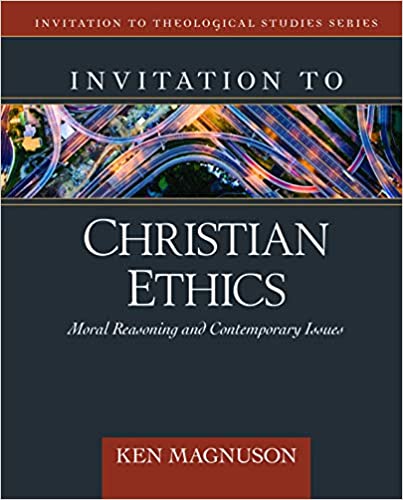A Brief Book Summary from Books At a Glance
by Steve West
About the Author
Ken Magnuson is the executive director of the Evangelical Theological Society, as well as Professor of Christian Ethics at Southwestern Baptist Theological Seminary.
Table of Contents
PART ONE: PHILOSOPHICAL FOUNDATIONS
1 An Invitation to Christian Ethics
2 Ethics and Moral Reasoning
PART TWO: BIBLICAL FOUNDATIONS
3 The Bible and Christian Ethics
4 Aspects of Biblical Ethics: Old Testament
5 Aspects of Biblical Ethics: New Testament
PART THREE: MARRIAGE AND HUMAN SEXUALITY
6 Sexual Ethics
7 Marriage and Sexuality
8 Divorce and Remarriage
9 Homosexuality, Sexual Identity, and Gender
PART FOUR: THE SANCTITY OF HUMAN LIFE
10 Bioethics and Human Personhood: The Case of the Human Embryo
11 Infertility and Assisted Reproductive Technologies
12 Abortion
13 Euthanasia and Physician-Assisted Suicide
PART FIVE: SOCIAL ORDER AND THE ENVIRONMENT
14 Capital Punishment
15 Just War, Pacifism, and the Use of Lethal Force
16 Race Relations
17 Creation Care
Summary
Chapters 1 & 2: An Invitation to Christian Ethics & Ethics and Moral Reasoning
Ethics is about things that are worthwhile, and although rules have an important part to play, rules are not everything in ethics. This book is written from the perspective of a Christian worldview. The Bible is filled with ethics from beginning to end. Since ethics shapes us and is about how we live our lives, it is incredibly important and not the least bit trivial or irrelevant. Our moral reasoning can improve when we think critically about ethics. Christians should be able to give reasons for their views. Studying ethics can be a great aid in helping us understand the perspectives of others. Ethical discussions can lead to gospel discussions. For those entering ministry, studying ethics is vital. With the destructive trends in our society, we need good ethics and good moral reasoning. Christian ethics glorifies God and shines our light before others.
There are several major systems or approaches to ethics. One approach, associated with Kant, is referred to as deontology. Deontology refers to duty. In Kant’s opinion, only that which was done disinterestedly out of a good will for the sake of duty was considered ethical. Moral principles are discoverable through reason and apply to everyone universally, regardless of the consequences generated by following them. In stark contrast to deontological ethics, consequentialism is the position that ethical actions are to be evaluated on the basis of the good or bad consequences that they produce. There are a number of types of consequentialism, including ethical egoism and varieties of utilitarianism. In contrast to deontology and consequentialism, virtue ethics places the focus more on the character of the moral agent rather than on acts or rules. . . .
[To continue reading this summary, please see below....]The remainder of this article is premium content. Become a member to continue reading.
Already have an account? Sign In
